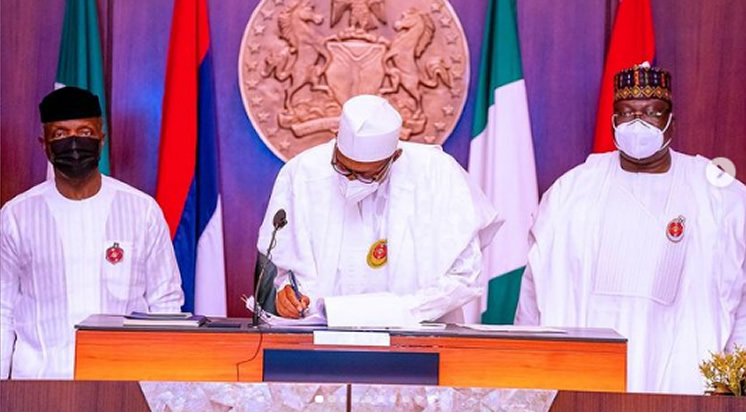President Muhammadu Buhari has charged the National Council on Climate Change on Wednesday in Abuja with developing appropriate policies to achieve green growth and sustainable economic development in Nigeria.
Inaugurating the Council prior to the start of the Federal Executive Council (FEC) meeting, the President stated that it marked the start of the implementation of the Climate Change Act 2021 and a new chapter in the country’s renewed response to climate change.
The President also directed the Attorney General and Minister of Justice, in collaboration with the Minister of Environment, to begin appropriate amendments to the Act’s “noticeable implementation challenges.”
The President described climate change as one of the most serious challenges facing humanity, citing the losses and damages caused by recent increasing floods in several parts of the country as well as Pakistan, Bangladesh, and other parts of East and Southern Africa.
”It [Climate Change] is complex and dynamic; and requires multidimensional and multi-sectoral initiatives to address its impacts and avert its rapid advance.
”Updated data show increases in sea level rise, heat waves, wild fires, floods, desertification, drying wetlands and many more disruptive climate occurrences.
”The latest Intergovernmental Panel on climate change report warns that rising Green House Gas emissions could soon outstrip the ability of communities to adapt, and the window for taking decisive steps needed to spare our planet from the gravest impacts of climate change is rapidly narrowing.
”We cannot ignore what is happening in our local environment. The increasing re-occurrence of floods in several parts of the country is a wakeup call,” he said, lamenting the loss of lives, damage and destruction of infrastructure such as roads, bridges, schools and agricultural production.
As a result, President Buhari reiterated his Administration’s determination to strengthen national response to climate change and accelerate the implementation of decisive actions to mitigate its effects on people and the economy.
He reaffirmed Nigeria’s membership in the United Nations Framework Convention on Climate Change, a long-standing international treaty aimed at combating “dangerous human interference with the climate system,” in part by stabilizing Green House Gas concentrations in the atmosphere.
”It is against this background that in November 2021, after COP 26 in Glasgow, I signed the Nigeria Climate Change Act despite noticeable implementation challenges inherent in the Act, to set the framework for mainstreaming climate change action, carbon budgeting and the establishment of the National Council on Climate Change.
”The council is tasked with the responsibility of formulating appropriate policies and other mechanisms for achieving low Green House Gas emissions, including green growth and sustainable economic development for Nigeria.
”In a clear demonstration of our commitments as enshrined in our Nationally Determined Contributions and the Net Zero-Target by 2060, I also approved, on 25th July 2022, the appointment of the Director General and Secretary for the National Council on Climate Change.
”It is imperative therefore that those lapses earlier alluded to – which includes the establishment of states and Zonal offices creating a huge and costly bureaucracy is not acceptable.
“The Act also takes out the Commissioners of Environments from the states as members of Council, it also did not make transitional provisions capturing the work of the Inter-ministerial Working Group.
”This group was responsible for Energy Transition, the supervisory oversight of the Ministry of Environment and the establishment of an Executive Management structure at the secretariat level to support the DG in running the Council Secretariat.
”Accordingly, I hereby direct the Attorney General and Minister of Justice in conjunction with the Minister of Environment to initiate the appropriate amendment to reflect these observations.”
The President expressed optimism that the National Council on Climate Change would harmonise all issues relating to Climate Change, Energy Transition Plan, Emissions Trading Scheme, and the Carbon Trading Framework, in accordance with its mandate under the Act, so that Nigeria can have a robust and impactful outing that captures Nigeria’s Climate Change priorities ahead of COP27 in Sharm El Shiekh, Egypt.
He stated that the council’s composition reflects the magnitude of the problem and the seriousness of our response, and that it includes the highest level of governance as well as representation from all key sectors of the economy.
President Buhari also took the opportunity to thank Vice President Yemi Osinbajo for spearheading Nigeria’s Energy Transition Plan, presided over its global launch, and initiated its marketing by engaging key stakeholders in the United States.
He urged the Council to build on these initial steps and ensure the plan’s ongoing marketing.
The Minister of Environment, Mohammed Abdullahi, thanked the President for “walking the walk” on climate change at the international, regional, and national levels, demonstrating tremendous leadership in Nigeria’s quest for net-zero emissions by 2060.
